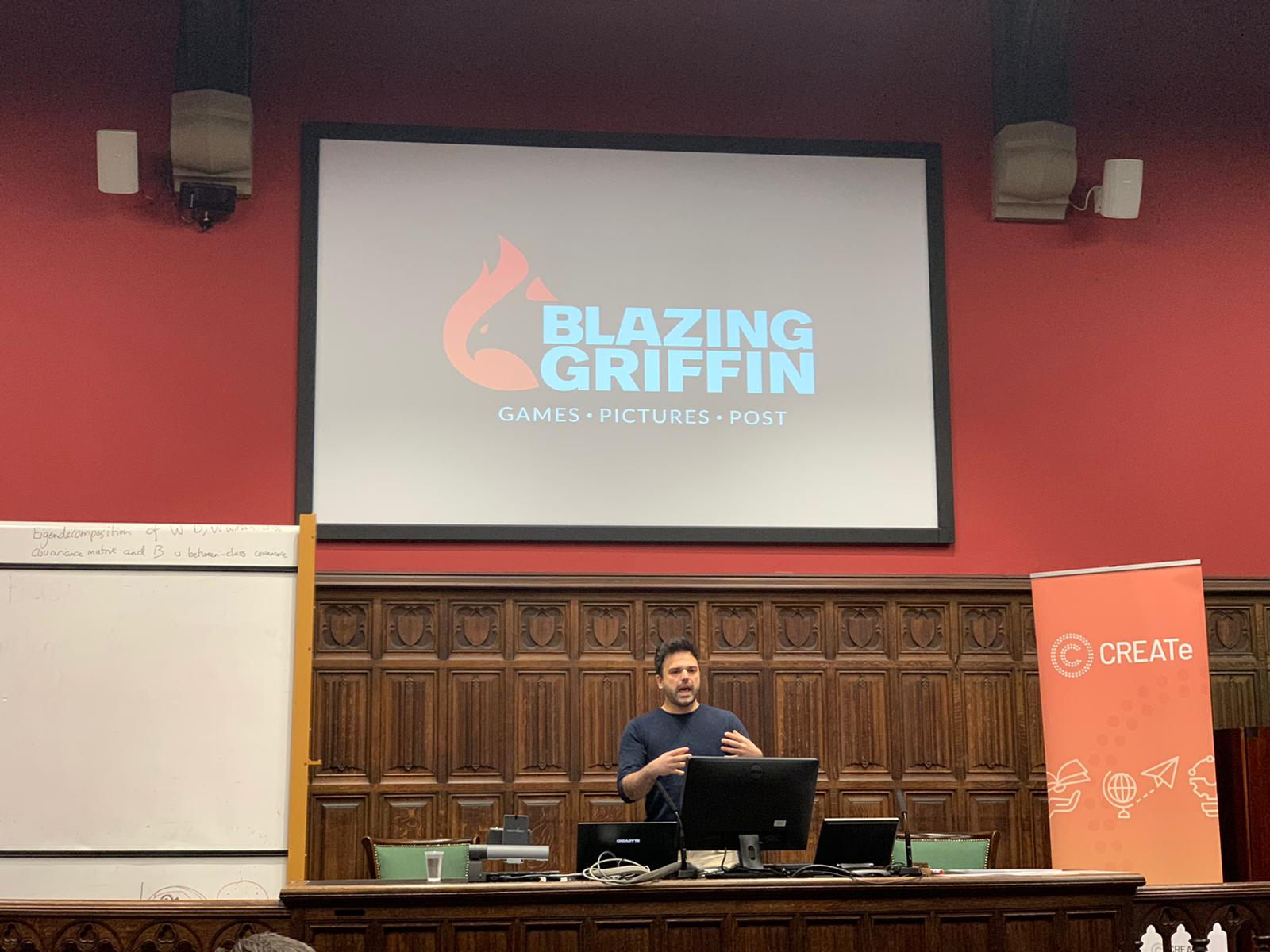Report by Kenny Barr (Research Associate in School of Culture and Creative Arts, University of Glasgow).

Naysun Alae-Carew, Managing Director of Blazing Griffin, presenting in the CREATe Public Lecture series 2019-2020
The latest in the CREATe public lecture series was delivered by Naysun Alae-Carew, Managing Director of Blazing Griffin, a digital entertainment company based in Glasgow. Employing around 40 staff, Blazing Griffin specialises in film and television production, game development and post production.
This searching talk provided rich ‘insider’ insights into the realities of running a production company operating in three overlapping but distinct industries: television, film and games. The speaker reflected on the different characteristics of these sectors as he saw them. Television is a highly regulated oligopoly dominated by broadcasters where ‘terms of trade’ rules govern how deals between producers and these broadcaster buyers are structured. Film, while less regulated, is described by Naysun as a “bisected market” dominated by a handful of large studios and many more independent producers. By comparison, business model innovation in the nascent online games market continues to rapidly and fundamentally alter relationships between producers, publishers and platforms.

Naysun’s lecture included examples of Blazing Griffin’s work, including the Christmas zombie musical film ‘Anna and the Apocalypse’
Naysun reflected and ruminated on the ways intellectual property permeates the core activities of his company and, in turn, shapes creative and commercial decision-making. Like many creatives, he explained that his understanding of IP has developed in an ad-hoc, piecemeal way as different commercial challenges and opportunities arise. Indeed, problems of information asymmetry characterise negotiations between small and medium sized production entities like Blazing Griffin, and larger operators such as public service broadcasters (PSB) or subscription video on demand (SVoD) platforms e.g. Netflix.
For new-entrant operators like Blazing Griffin, the short-term interests of the company are not always aligned with longer-term considerations. For example, the fees generated from ‘buy out’ deals with commissioning entities such as a film studio or an SVoD can be vital to the day-to-day financial liquidity of a company. However, this type of deal limits the scope for production companies to develop a portfolio of potentially valuable IP over a longer term. Conversely, commissions from PSBs may attract modest production tariffs but allow production companies to retain an interest in secondary and tertiary IP rights, such as multi-territory licensing.
In UK television production, the implementation of ‘terms of trade’ following the Communications Act 2003 were designed to equalise the relative bargaining position of powerful broadcasters and smaller TV producers. This ensured production companies retain an interest the IP that subsists in outputs commissioned by PSBs. As Naysun suggested, the effect of this policy ‘lever’ being pushed was an explosion of entrepreneurial activity and growth in the UK television production sector.
The intended and unintended consequences of this change to ‘terms of trade’ continue to be felt to this day. As discussed by the speaker, and examined elsewhere in CREATe and the wider university research community, the most significant unintended consequence was to make UK television production companies attractive targets for takeover by larger operators. In effect, rather than supporting a diverse production ecosystem of small, medium and large operators, the IP rights conferred on production companies increasingly pool into concentrated catalogues of powerful transnational media conglomerates thus reinforcing the market power of consolidated incumbents.
However, the emergence of powerful new entrant gatekeepers such as SVoDs and online game platforms not governed by regulations like ‘terms of trade’ continues to reset the barriers to entry Blazing Griffin must overcome in order to succeed in highly competitive markets. Indeed, a theme that ran through much of this illuminating and thought-provoking talk was that companies like Blazing Griffin must be sufficiently nimble to operate a mixed model with regards to intellectual property. This involves a trade-off between the security of dependable upfront fees offered by film studio or SVoD commissions, against the unknown but potentially lucrative rewards and opportunities available to companies that retain control of rights in projects that subsequently become ‘hits’.
While the speaker’s personal preference leaned towards Blazing Griffin controlling the IP in the content they produce, he summed up by observing that there is no definitive answer as to what path is best with regards to selling or retaining IP assets. In doing so, Naysun echoed Richard Caves (2000) seminal work on contracts between art and commerce in the IP intensive creative industries. Caves contends that the overriding rule of forecasting the success of creative products is “nobody knows”.
 The CREATe Public Lecture series is part of the AHRC Creative Industries Policy & Evidence Centre
The CREATe Public Lecture series is part of the AHRC Creative Industries Policy & Evidence Centre




